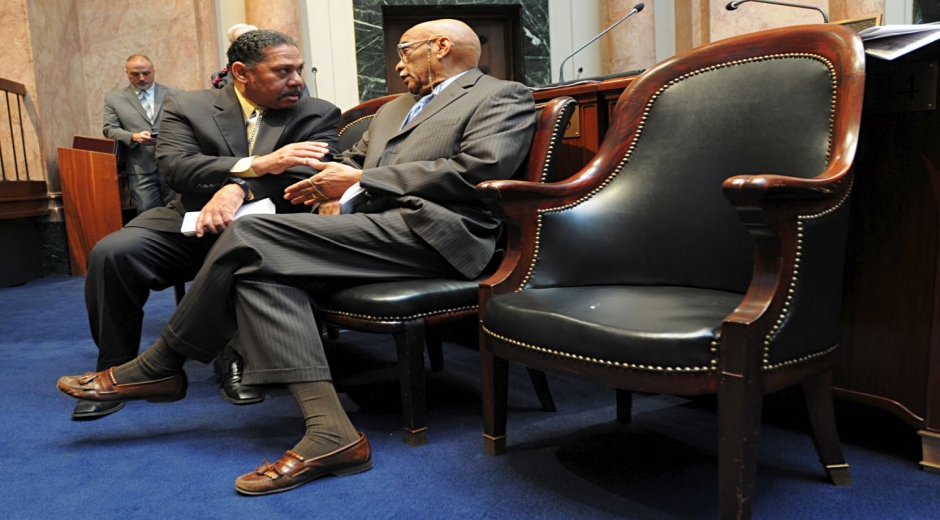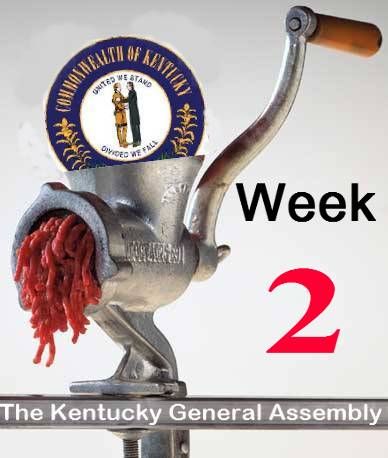
Felony Expungement Measure Clears House Committee

Thomas McAdam
iLocalNews Louisville is your best source of news and information about Derby City.
- Professional Journalist
Legislation that would allow Kentucky’s courts to expunge the felony records of up to 94,000 Kentuckians cleared the House Judiciary Committee yesterday.
House Bill 40, sponsored by House Judiciary Chair Rep. Darryl Owens, D-Louisville, and Rep. David Floyd, R-Bardstown, was discussed for over an hour before the committee approved it. The bill is nearly identical to 2015 HB 40, which passed the House by a vote of 84-14 but stalled in the Senate last session. Other versions of the bill have been considered in earlier sessions.
This session’s felony expungement bill would:
· Allow the expungement—or sealing—of felony charges that did not lead to a grand jury indictment with input from affected parties, including any victim or victims.
· Allow expungement of Class D felonies with input from all affected parties, including any victim or victims. Sex offenders, those who committed an offense against a child or vulnerable adult, those who have recently been convicted of another offense or violation, or those against whom charges are pending would not be eligible for expungement.
· Prevent information pertaining to an expunged conviction from being use in a civil suit or proceedings involving negligent hiring or licensing.
Any felon eligible for expungement, and certain non-felony offenders eligible for expungement under the bill, could petition the courts to have their records sealed no matter how long ago they were convicted, according to the legislation.
Floyd told the committee that Kentucky’s rate of felony recidivism—or committing another offense —would be “greatly reduced if there was hope at the end of the tunnel for these individuals.” The current rate of recidivism stands at 41 percent, according to testimony on the bill from Lexington attorney Russell Coleman.
House Majority Whip Johnny Bell, D-Glasgow, called the bill “a common sense approach” that will give judges discretion to review each case while giving felons the “an opportunity at redemption and hope.”
“It’s very important to our society and the future of the state,” Bell said.
House Minority Caucus Chair Stan Lee, R-Lexington, said he continues to have concerns about the legislation.
“It seems in part by this legislation that … philosophically, we’re sort of taking away people’s ability to knowingly forgive. We’re hiding it from people,” said Lee. “There are other considerations that I think we need to fully vet before this bill becomes law.”
Kentucky’s expungement statutes do not currently allow for expungement of felonies, although Class D felons may be allowed to complete pretrial diversion to clear their name. There is a pathway under Kentucky law for expungement of misdemeanor crimes.
In other matters before the General Assembly this session, bills that would disclose the value of state legislators’ public pensions and move the governor’s race to federal-election years were passed out of a Senate committee yesterday.
Members of the Senate Standing Committee on State and Local Government unanimously voted for the legislative pension bill (Senate Bill 45) and the election cycle bill (Senate Bill 10).
Sen. Christian McDaniel, R-Taylor Mill, who sponsored both bills, said the pieces of legislation were designed to strengthen the public’s faith and increase citizen participation in the democratic process.
SB 45 would allow pension managers to disclose the name and benefit amount for any current or former lawmaker by making those figures subject to the state’s open records laws.
“The issue of pensions in the commonwealth have been shrouded in a level of secrecy that is unparalleled to elsewhere in state government,” McDaniel said, who is also a member of the committee. “This requirement will introduce a greater level of accountability to those of us who have to cast ballots on some of the most difficult, contentious and painful issues confronting us today.”
Legislative leaders say one of the greatest challenges of this session will be to find more money for the public pension systems. The systems carry more than $30 million in unfunded pension liabilities. State economists say the main pension plans for government workers and public school teacher are in the most trouble.
SB 10 is in the form of a constitutional amendment. It would move election for governor and other statewide constitutional officers to even-numbered years when congressional and presidential elections are held. If it passes the General Assembly, the proposed change to the state Constitution would appear on the November ballot.
McDaniel said SB 10 would save Kentucky $3.5 million and its 120 counties more than $14 million every four years by consolidating the dates elections are held. That translate to $603,000 in saving for Kenton County, $173,000 in saving for Pike County, $45,000 saving for Clay County and $1.3 million in saving for Jefferson County.
“When every level of government is struggling for funding, this is a simple way to save a significant amount of money,” McDaniel said.

Gideon John Tucker (February 10, 1826 – July 1899) was an American lawyer, newspaper editor and politician. In 1866, as Surrogate of New York, he wrote in a decision of a will case (Final Accounting in the Estate of A.B., 1 Tucker 248, N.Y. Surr. 1866): "No man's life, liberty or property are safe while the Legislature is in session."